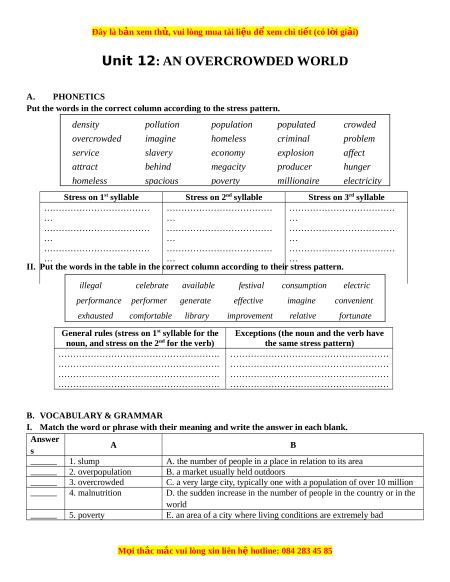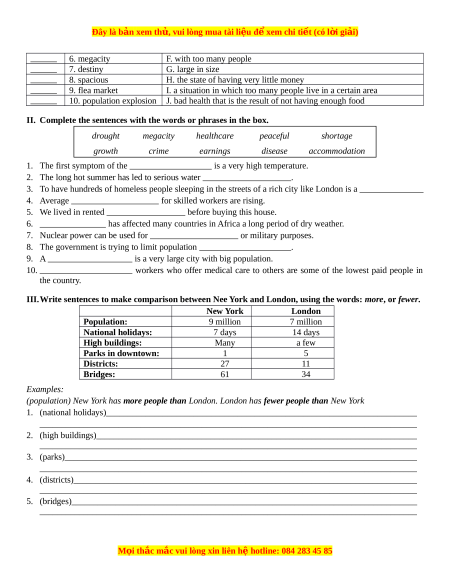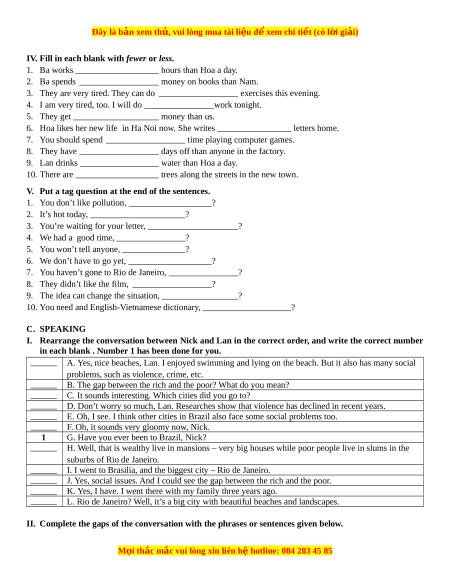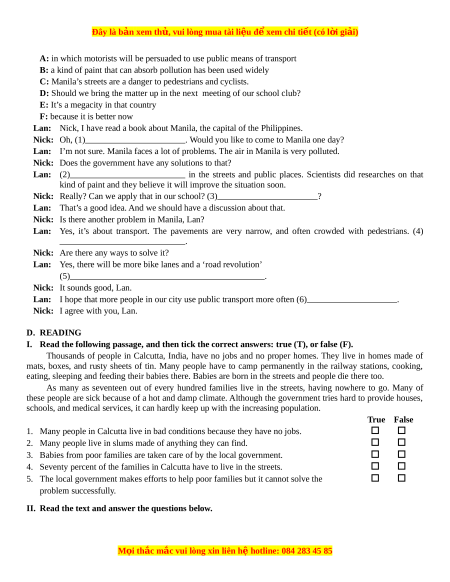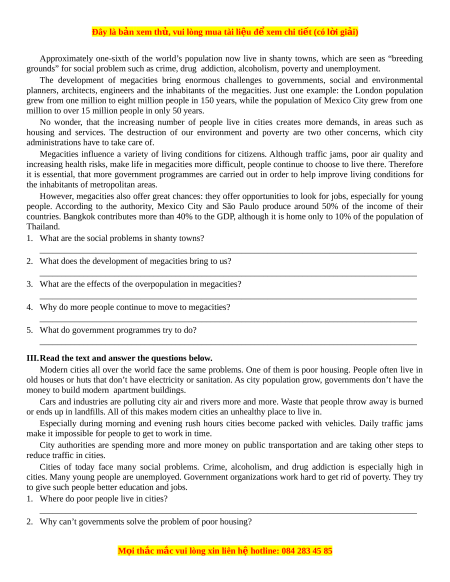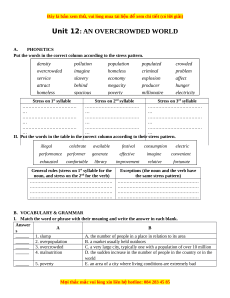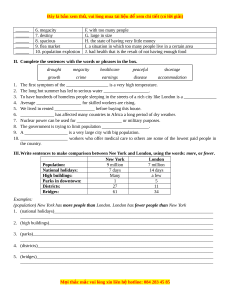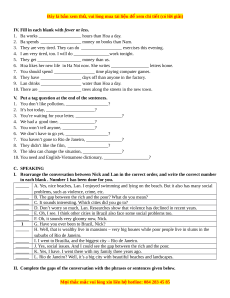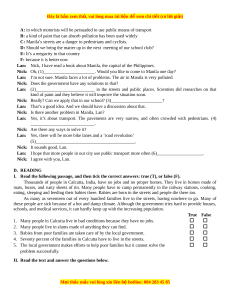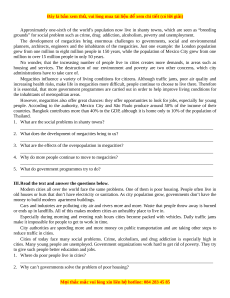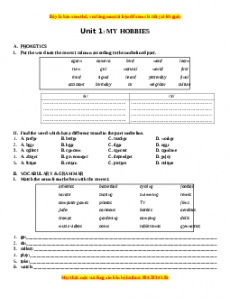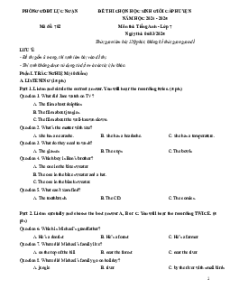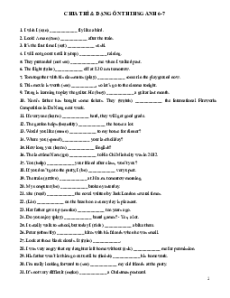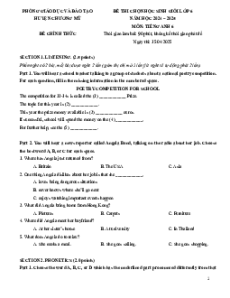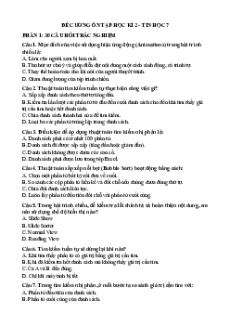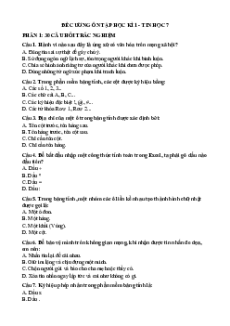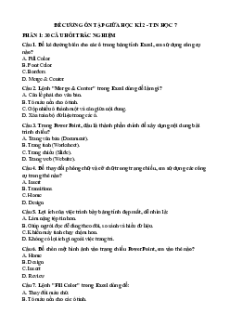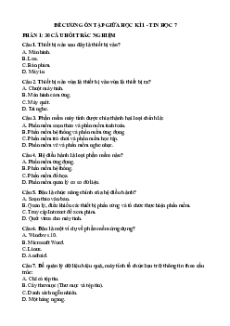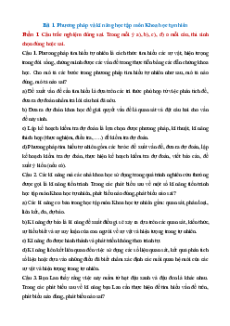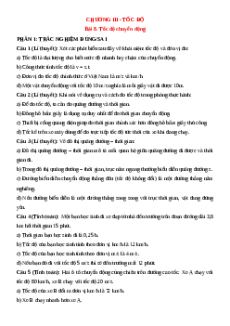ệ đ xe ể m chi ti t ế (có l i ờ gi i ả )
Unit 12: AN OVERCROWDED WORLD A. PHONETICS
Put the words in the correct column according to the stress pattern. density pollution population populated crowded overcrowded imagine homeless criminal problem service slavery economy explosion affect attract behind megacity producer hunger homeless spacious poverty millionaire electricity Stress on 1st syllable Stress on 2nd syllable Stress on 3rd syllable
………………………………
………………………………
……………………………… … … …
………………………………
………………………………
……………………………… … … …
………………………………
………………………………
……………………………… … … …
II. Put the words in the table in the correct column according to their stress pattern. illegal celebrate available festival consumption electric performance performer generate effective imagine convenient exhausted comfortable library improvement relative fortunate
General rules (stress on 1st syllable for the
Exceptions (the noun and the verb have
noun, and stress on the 2nd for the verb)
the same stress pattern)
……………………………………………….
………………………………………………
……………………………………………….
………………………………………………
……………………………………………….
………………………………………………
……………………………………………….
……………………………………………… B. VOCABULARY & GRAMMAR
I. Match the word or phrase with their meaning and write the answer in each blank. Answer A B s 1. slump
A. the number of people in a place in relation to its area 2. overpopulation
B. a market usually held outdoors 3. overcrowded
C. a very large city, typically one with a population of over 10 million 4. malnutrition
D. the sudden increase in the number of people in the country or in the world 5. poverty
E. an area of a city where living conditions are extremely bad M i
ọ thắc mắc vui lòng xin liên hệ hotline: 084 283 45 85
ệ đ xe ể m chi ti t ế (có l i ờ gi i ả ) 6. megacity F. with too many people 7. destiny G. large in size 8. spacious
H. the state of having very little money 9. flea market
I. a situation in which too many people live in a certain area
10. population explosion J. bad health that is the result of not having enough food
II. Complete the sentences with the words or phrases in the box. drought megacity healthcare peaceful shortage growth crime earnings disease accommodation 1. The first symptom of the is a very high temperature.
2. The long hot summer has led to serious water .
3. To have hundreds of homeless people sleeping in the streets of a rich city like London is a 4. Average
for skilled workers are rising. 5. We lived in rented before buying this house. 6.
has affected many countries in Africa a long period of dry weather.
7. Nuclear power can be used for or military purposes.
8. The government is trying to limit population . 9. A
is a very large city with big population. 10.
workers who offer medical care to others are some of the lowest paid people in the country.
III.Write sentences to make comparison between Nee York and London, using the words: more, or fewer. New York London Population: 9 million 7 million National holidays: 7 days 14 days High buildings: Many a few Parks in downtown: 1 5 Districts: 27 11 Bridges: 61 34 Examples:
(population) New York has more people than London. London has fewer people than New York
1. (national holidays)_______________________________________________________________________
______________________________________________________________________________________
2. (high buildings)_________________________________________________________________________
______________________________________________________________________________________
3. (parks)________________________________________________________________________________
______________________________________________________________________________________
4. (districts)______________________________________________________________________________
______________________________________________________________________________________
5. (bridges)_______________________________________________________________________________
______________________________________________________________________________________ M i
ọ thắc mắc vui lòng xin liên hệ hotline: 084 283 45 85
ệ đ xe ể m chi ti t ế (có l i ờ gi i ả )
IV. Fill in each blank with fewer or less. 1. Ba works hours than Hoa a day. 2. Ba spends money on books than Nam.
3. They are very tired. They can do exercises this evening.
4. I am very tired, too. I will do work tonight. 5. They get money than us.
6. Hoa likes her new life in Ha Noi now. She writes letters home. 7. You should spend time playing computer games. 8. They have
days off than anyone in the factory. 9. Lan drinks water than Hoa a day. 10. There are
trees along the streets in the new town.
V. Put a tag question at the end of the sentences.
1. You don’t like pollution, ? 2. It’s hot today, ?
3. You’re waiting for your letter, ? 4. We had a good time, ? 5. You won’t tell anyone, ? 6. We don’t have to go yet, ?
7. You haven’t gone to Rio de Janeiro, ?
8. They didn’t like the film, ?
9. The idea can change the situation, ?
10. You need and English-Vietnamese dictionary, ? C. SPEAKING
I. Rearrange the conversation between Nick and Lan in the correct order, and write the correct number
in each blank . Number 1 has been done for you.
A. Yes, nice beaches, Lan. I enjoyed swimming and lying on the beach. But it also has many social
problems, such as violence, crime, etc.
B. The gap between the rich and the poor? What do you mean?
C. It sounds interesting. Which cities did you go to?
D. Don’t worry so much, Lan. Researches show that violence has declined in recent years.
E. Oh, I see. I think other cities in Brazil also face some social problems too.
F. Oh, it sounds very gloomy now, Nick. 1
G. Have you ever been to Brazil, Nick?
H. Well, that is wealthy live in mansions – very big houses while poor people live in slums in the suburbs of Rio de Janeiro.
I. I went to Brasilia, and the biggest city – Rio de Janeiro.
J. Yes, social issues. And I could see the gap between the rich and the poor.
K. Yes, I have. I went there with my family three years ago.
L. Rio de Janeiro? Well, it’s a big city with beautiful beaches and landscapes.
II. Complete the gaps of the conversation with the phrases or sentences given below. M i
ọ thắc mắc vui lòng xin liên hệ hotline: 084 283 45 85
ệ đ xe ể m chi ti t ế (có l i ờ gi i ả )
A: in which motorists will be persuaded to use public means of transport
B: a kind of paint that can absorb pollution has been used widely
C: Manila’s streets are a danger to pedestrians and cyclists.
D: Should we bring the matter up in the next meeting of our school club?
E: It’s a megacity in that country
F: because it is better now
Lan: Nick, I have read a book about Manila, the capital of the Philippines. Nick: Oh, (1)
. Would you like to come to Manila one day?
Lan: I’m not sure. Manila faces a lot of problems. The air in Manila is very polluted.
Nick: Does the government have any solutions to that? Lan: (2)
in the streets and public places. Scientists did researches on that
kind of paint and they believe it will improve the situation soon.
Nick: Really? Can we apply that in our school? (3) ?
Lan: That’s a good idea. And we should have a discussion about that.
Nick: Is there another problem in Manila, Lan?
Lan: Yes, it’s about transport. The pavements are very narrow, and often crowded with pedestrians. (4) .
Nick: Are there any ways to solve it?
Lan: Yes, there will be more bike lanes and a ‘road revolution’ (5) .
Nick: It sounds good, Lan.
Lan: I hope that more people in our city use public transport more often (6) .
Nick: I agree with you, Lan. D. READING
I. Read the following passage, and then tick the correct answers: true (T), or false (F).
Thousands of people in Calcutta, India, have no jobs and no proper homes. They live in homes made of
mats, boxes, and rusty sheets of tin. Many people have to camp permanently in the railway stations, cooking,
eating, sleeping and feeding their babies there. Babies are born in the streets and people die there too.
As many as seventeen out of every hundred families live in the streets, having nowhere to go. Many of
these people are sick because of a hot and damp climate. Although the government tries hard to provide houses,
schools, and medical services, it can hardly keep up with the increasing population. True False
1. Many people in Calcutta live in bad conditions because they have no jobs.
2. Many people live in slums made of anything they can find.
3. Babies from poor families are taken care of by the local government.
4. Seventy percent of the families in Calcutta have to live in the streets.
5. The local government makes efforts to help poor families but it cannot solve the problem successfully.
II. Read the text and answer the questions below. M i
ọ thắc mắc vui lòng xin liên hệ hotline: 084 283 45 85
Bài tập Unit 12: An overcrowded world Tiếng Anh 7 chương trình thí điểm - Lưu Hoằng Trí
563
282 lượt tải
MUA NGAY ĐỂ XEM TOÀN BỘ TÀI LIỆU
CÁCH MUA:
- B1: Gửi phí vào TK:
1133836868- CT TNHH DAU TU VA DV GD VIETJACK - Ngân hàng MB (QR) - B2: Nhắn tin tới Zalo VietJack Official ( nhấn vào đây ) để xác nhận thanh toán và tải tài liệu - giáo án
Liên hệ ngay Hotline hỗ trợ: 084 283 45 85
Tài liệu được cập nhật liên tục trong gói này từ nay đến hết tháng 6/2023. Chúng tôi đảm bảo đủ số lượng đề đã cam kết hoặc có thể nhiều hơn, tất cả có BẢN WORD, LỜI GIẢI CHI TIẾT và tải về dễ dàng.
Để tải tài liệu gốc về máy bạn click vào nút Tải Xuống ở trên!
Thuộc bộ (mua theo bộ để tiết kiệm hơn):
- Tailieugiaovien.com.vn giới thiệu Bộ bài tập trắc nghiệm Tiếng Anh lớp 7 theo chương trình thí điểm biên soạn bởi GV Lưu Hoằng Trí mới nhất nhằm giúp Giáo viên có thêm tài liệu tham khảo bài tập Tiếng Anh lớp 7.
- File word có lời giải chi tiết 100%.
- Mua trọn bộ sẽ tiết kiệm hơn tải lẻ 50%.
Đánh giá
4.6 / 5(563 )5
4
3
2
1
Trọng Bình
Tài liệu hay
Giúp ích cho tôi rất nhiều
Duy Trần
Tài liệu chuẩn
Rất thích tài liệu bên VJ soạn (bám sát chương trình dạy)
TÀI LIỆU BỘ BÁN CHẠY MÔN Tiếng Anh
Xem thêmTÀI LIỆU BỘ BÁN CHẠY Lớp 7
Xem thêmTài liệu bộ mới nhất

Đây là b nả xem thử, vui lòng mua tài li u đ xem chi ti t (có l i gi i)ệ ể ế ờ ả
Unit 12: AN OVERCROWDED WORLD
A. PHONETICS
Put the words in the correct column according to the stress pattern.
II. Put the words in the table in the correct column according to their stress pattern.
B. VOCABULARY & GRAMMAR
I. Match the word or phrase with their meaning and write the answer in each blank.
Answer
s
A B
1. slump A. the number of people in a place in relation to its area
2. overpopulation B. a market usually held outdoors
3. overcrowded C. a very large city, typically one with a population of over 10 million
4. malnutrition D. the sudden increase in the number of people in the country or in the
world
5. poverty E. an area of a city where living conditions are extremely bad
M iọ th c m c vui lòng xin liên hắ ắ ệ hotline: 084 283 45 85
density pollution population populated crowded
overcrowded imagine homeless criminal problem
service slavery economy explosion affect
attract behind megacity producer hunger
homeless spacious poverty millionaire electricity
Stress on 1
st
syllable Stress on 2
nd
syllable Stress on 3
rd
syllable
………………………………
…
………………………………
…
………………………………
…
………………………………
…
………………………………
…
………………………………
…
………………………………
…
………………………………
…
………………………………
…
illegal celebrate available festival consumption electric
performance performer generate effective imagine convenient
exhausted comfortable library improvement relative fortunate
General rules (stress on 1
st
syllable for the
noun, and stress on the 2
nd
for the verb)
Exceptions (the noun and the verb have
the same stress pattern)
……………………………………………….
……………………………………………….
……………………………………………….
……………………………………………….
………………………………………………
………………………………………………
………………………………………………
………………………………………………

Đây là b nả xem thử, vui lòng mua tài li u đ xem chi ti t (có l i gi i)ệ ể ế ờ ả
6. megacity F. with too many people
7. destiny G. large in size
8. spacious H. the state of having very little money
9. flea market I. a situation in which too many people live in a certain area
10. population explosion J. bad health that is the result of not having enough food
II. Complete the sentences with the words or phrases in the box.
1. The first symptom of the is a very high temperature.
2. The long hot summer has led to serious water .
3. To have hundreds of homeless people sleeping in the streets of a rich city like London is a
4. Average for skilled workers are rising.
5. We lived in rented before buying this house.
6. has affected many countries in Africa a long period of dry weather.
7. Nuclear power can be used for or military purposes.
8. The government is trying to limit population .
9. A is a very large city with big population.
10. workers who offer medical care to others are some of the lowest paid people in
the country.
III.Write sentences to make comparison between Nee York and London, using the words: more, or fewer.
New York London
Population: 9 million 7 million
National holidays: 7 days 14 days
High buildings: Many a few
Parks in downtown: 1 5
Districts: 27 11
Bridges: 61 34
Examples:
(population) New York has more people than London. London has fewer people than New York
1. (national holidays)_______________________________________________________________________
______________________________________________________________________________________
2. (high buildings)_________________________________________________________________________
______________________________________________________________________________________
3. (parks)________________________________________________________________________________
______________________________________________________________________________________
4. (districts)______________________________________________________________________________
______________________________________________________________________________________
5. (bridges)_______________________________________________________________________________
______________________________________________________________________________________
M iọ th c m c vui lòng xin liên hắ ắ ệ hotline: 084 283 45 85
drought megacity healthcare peaceful shortage
growth crime earnings disease accommodation

Đây là b nả xem thử, vui lòng mua tài li u đ xem chi ti t (có l i gi i)ệ ể ế ờ ả
IV. Fill in each blank with fewer or less.
1. Ba works hours than Hoa a day.
2. Ba spends money on books than Nam.
3. They are very tired. They can do exercises this evening.
4. I am very tired, too. I will do work tonight.
5. They get money than us.
6. Hoa likes her new life in Ha Noi now. She writes letters home.
7. You should spend time playing computer games.
8. They have days off than anyone in the factory.
9. Lan drinks water than Hoa a day.
10. There are trees along the streets in the new town.
V. Put a tag question at the end of the sentences.
1. You don’t like pollution, ?
2. It’s hot today, ?
3. You’re waiting for your letter, ?
4. We had a good time, ?
5. You won’t tell anyone, ?
6. We don’t have to go yet, ?
7. You haven’t gone to Rio de Janeiro, ?
8. They didn’t like the film, ?
9. The idea can change the situation, ?
10. You need and English-Vietnamese dictionary, ?
C. SPEAKING
I. Rearrange the conversation between Nick and Lan in the correct order, and write the correct number
in each blank . Number 1 has been done for you.
A. Yes, nice beaches, Lan. I enjoyed swimming and lying on the beach. But it also has many social
problems, such as violence, crime, etc.
B. The gap between the rich and the poor? What do you mean?
C. It sounds interesting. Which cities did you go to?
D. Don’t worry so much, Lan. Researches show that violence has declined in recent years.
E. Oh, I see. I think other cities in Brazil also face some social problems too.
F. Oh, it sounds very gloomy now, Nick.
1 G. Have you ever been to Brazil, Nick?
H. Well, that is wealthy live in mansions – very big houses while poor people live in slums in the
suburbs of Rio de Janeiro.
I. I went to Brasilia, and the biggest city – Rio de Janeiro.
J. Yes, social issues. And I could see the gap between the rich and the poor.
K. Yes, I have. I went there with my family three years ago.
L. Rio de Janeiro? Well, it’s a big city with beautiful beaches and landscapes.
II. Complete the gaps of the conversation with the phrases or sentences given below.
M iọ th c m c vui lòng xin liên hắ ắ ệ hotline: 084 283 45 85

Đây là b nả xem thử, vui lòng mua tài li u đ xem chi ti t (có l i gi i)ệ ể ế ờ ả
A: in which motorists will be persuaded to use public means of transport
B: a kind of paint that can absorb pollution has been used widely
C: Manila’s streets are a danger to pedestrians and cyclists.
D: Should we bring the matter up in the next meeting of our school club?
E: It’s a megacity in that country
F: because it is better now
Lan: Nick, I have read a book about Manila, the capital of the Philippines.
Nick: Oh, (1) . Would you like to come to Manila one day?
Lan: I’m not sure. Manila faces a lot of problems. The air in Manila is very polluted.
Nick: Does the government have any solutions to that?
Lan: (2) in the streets and public places. Scientists did researches on that
kind of paint and they believe it will improve the situation soon.
Nick: Really? Can we apply that in our school? (3) ?
Lan: That’s a good idea. And we should have a discussion about that.
Nick: Is there another problem in Manila, Lan?
Lan: Yes, it’s about transport. The pavements are very narrow, and often crowded with pedestrians. (4)
.
Nick: Are there any ways to solve it?
Lan: Yes, there will be more bike lanes and a ‘road revolution’
(5) .
Nick: It sounds good, Lan.
Lan: I hope that more people in our city use public transport more often (6) .
Nick: I agree with you, Lan.
D. READING
I. Read the following passage, and then tick the correct answers: true (T), or false (F).
Thousands of people in Calcutta, India, have no jobs and no proper homes. They live in homes made of
mats, boxes, and rusty sheets of tin. Many people have to camp permanently in the railway stations, cooking,
eating, sleeping and feeding their babies there. Babies are born in the streets and people die there too.
As many as seventeen out of every hundred families live in the streets, having nowhere to go. Many of
these people are sick because of a hot and damp climate. Although the government tries hard to provide houses,
schools, and medical services, it can hardly keep up with the increasing population.
True False
1. Many people in Calcutta live in bad conditions because they have no jobs.
2. Many people live in slums made of anything they can find.
3. Babies from poor families are taken care of by the local government.
4. Seventy percent of the families in Calcutta have to live in the streets.
5. The local government makes efforts to help poor families but it cannot solve the
problem successfully.
II. Read the text and answer the questions below.
M iọ th c m c vui lòng xin liên hắ ắ ệ hotline: 084 283 45 85

Đây là b nả xem thử, vui lòng mua tài li u đ xem chi ti t (có l i gi i)ệ ể ế ờ ả
Approximately one-sixth of the world’s population now live in shanty towns, which are seen as “breeding
grounds” for social problem such as crime, drug addiction, alcoholism, poverty and unemployment.
The development of megacities bring enormous challenges to governments, social and environmental
planners, architects, engineers and the inhabitants of the megacities. Just one example: the London population
grew from one million to eight million people in 150 years, while the population of Mexico City grew from one
million to over 15 million people in only 50 years.
No wonder, that the increasing number of people live in cities creates more demands, in areas such as
housing and services. The destruction of our environment and poverty are two other concerns, which city
administrations have to take care of.
Megacities influence a variety of living conditions for citizens. Although traffic jams, poor air quality and
increasing health risks, make life in megacities more difficult, people continue to choose to live there. Therefore
it is essential, that more government programmes are carried out in order to help improve living conditions for
the inhabitants of metropolitan areas.
However, megacities also offer great chances: they offer opportunities to look for jobs, especially for young
people. According to the authority, Mexico City and São Paulo produce around 50% of the income of their
countries. Bangkok contributes more than 40% to the GDP, although it is home only to 10% of the population of
Thailand.
1. What are the social problems in shanty towns?
______________________________________________________________________________________
2. What does the development of megacities bring to us?
______________________________________________________________________________________
3. What are the effects of the overpopulation in megacities?
______________________________________________________________________________________
4. Why do more people continue to move to megacities?
______________________________________________________________________________________
5. What do government programmes try to do?
______________________________________________________________________________________
III.Read the text and answer the questions below.
Modern cities all over the world face the same problems. One of them is poor housing. People often live in
old houses or huts that don’t have electricity or sanitation. As city population grow, governments don’t have the
money to build modern apartment buildings.
Cars and industries are polluting city air and rivers more and more. Waste that people throw away is burned
or ends up in landfills. All of this makes modern cities an unhealthy place to live in.
Especially during morning and evening rush hours cities become packed with vehicles. Daily traffic jams
make it impossible for people to get to work in time.
City authorities are spending more and more money on public transportation and are taking other steps to
reduce traffic in cities.
Cities of today face many social problems. Crime, alcoholism, and drug addiction is especially high in
cities. Many young people are unemployed. Government organizations work hard to get rid of poverty. They try
to give such people better education and jobs.
1. Where do poor people live in cities?
______________________________________________________________________________________
2. Why can’t governments solve the problem of poor housing?
M iọ th c m c vui lòng xin liên hắ ắ ệ hotline: 084 283 45 85
